Analysis of Joe Fresh Case Study: CSR Violations and Ethical Dilemmas
VerifiedAdded on 2022/09/16
|6
|1698
|210
Case Study
AI Summary
This case study analyzes the ethical and corporate social responsibility (CSR) failures of Joe Fresh, a Canadian fashion brand, following the 2013 Rana Plaza factory collapse in Bangladesh. The analysis examines Joe Fresh's initial response, its commitment to continue operations in Bangladesh despite safety concerns, and the subsequent damage to its reputation. The assignment highlights the company's violations of CSR principles, particularly in ethical and legal responsibilities, and discusses the implications for the company's stakeholders. It also explores the company's efforts to compensate victims and improve factory safety. The analysis delves into the ethical, legal, moral, and philanthropic obligations that companies like Joe Fresh have towards their workers in developing countries, emphasizing the importance of accountability and transparency in the fashion industry and the need for businesses to meet societal expectations. The case study draws on academic sources to support its arguments and provides a comprehensive overview of the issues surrounding the tragedy and its impact on the brand.
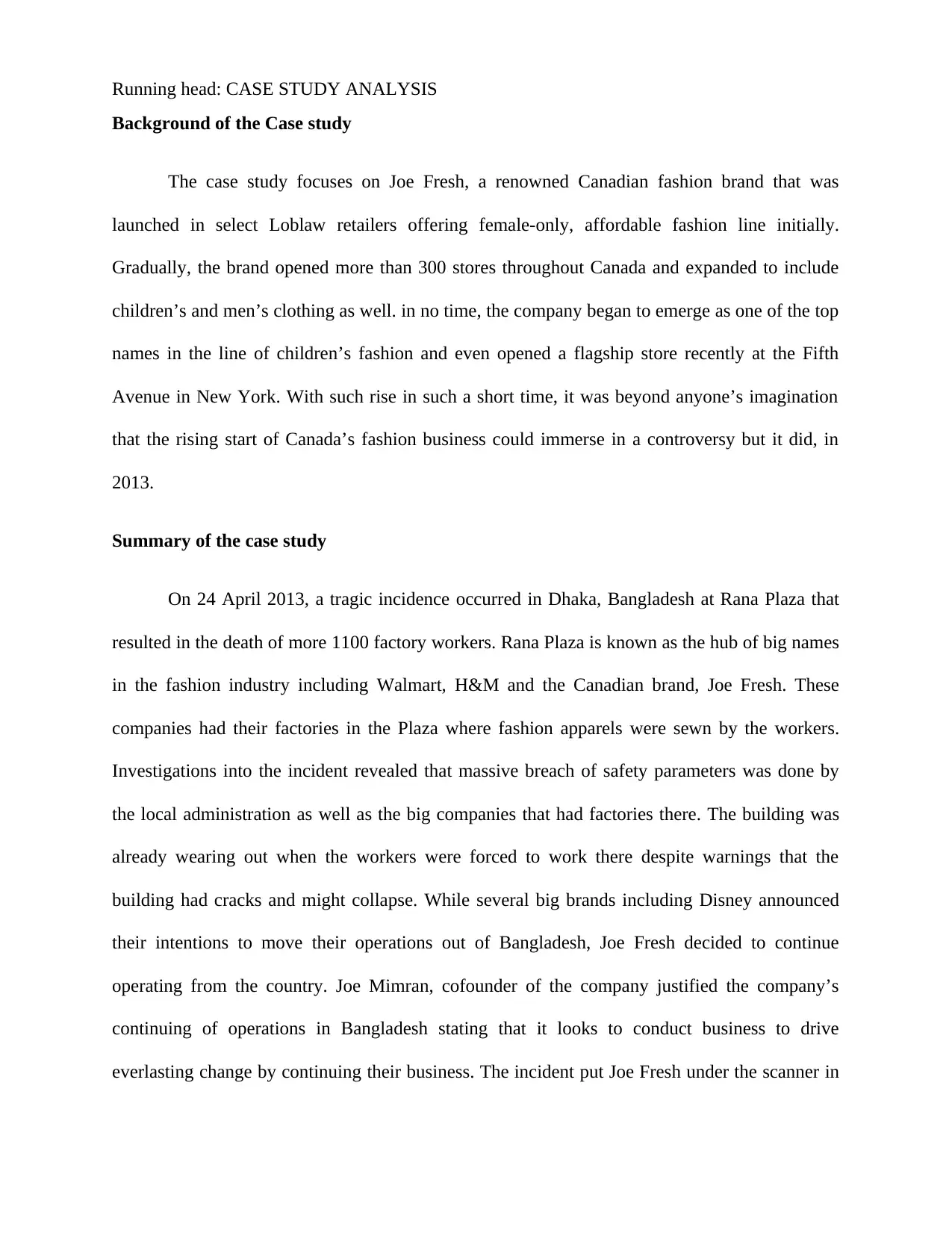
Running head: CASE STUDY ANALYSIS
Background of the Case study
The case study focuses on Joe Fresh, a renowned Canadian fashion brand that was
launched in select Loblaw retailers offering female-only, affordable fashion line initially.
Gradually, the brand opened more than 300 stores throughout Canada and expanded to include
children’s and men’s clothing as well. in no time, the company began to emerge as one of the top
names in the line of children’s fashion and even opened a flagship store recently at the Fifth
Avenue in New York. With such rise in such a short time, it was beyond anyone’s imagination
that the rising start of Canada’s fashion business could immerse in a controversy but it did, in
2013.
Summary of the case study
On 24 April 2013, a tragic incidence occurred in Dhaka, Bangladesh at Rana Plaza that
resulted in the death of more 1100 factory workers. Rana Plaza is known as the hub of big names
in the fashion industry including Walmart, H&M and the Canadian brand, Joe Fresh. These
companies had their factories in the Plaza where fashion apparels were sewn by the workers.
Investigations into the incident revealed that massive breach of safety parameters was done by
the local administration as well as the big companies that had factories there. The building was
already wearing out when the workers were forced to work there despite warnings that the
building had cracks and might collapse. While several big brands including Disney announced
their intentions to move their operations out of Bangladesh, Joe Fresh decided to continue
operating from the country. Joe Mimran, cofounder of the company justified the company’s
continuing of operations in Bangladesh stating that it looks to conduct business to drive
everlasting change by continuing their business. The incident put Joe Fresh under the scanner in
Background of the Case study
The case study focuses on Joe Fresh, a renowned Canadian fashion brand that was
launched in select Loblaw retailers offering female-only, affordable fashion line initially.
Gradually, the brand opened more than 300 stores throughout Canada and expanded to include
children’s and men’s clothing as well. in no time, the company began to emerge as one of the top
names in the line of children’s fashion and even opened a flagship store recently at the Fifth
Avenue in New York. With such rise in such a short time, it was beyond anyone’s imagination
that the rising start of Canada’s fashion business could immerse in a controversy but it did, in
2013.
Summary of the case study
On 24 April 2013, a tragic incidence occurred in Dhaka, Bangladesh at Rana Plaza that
resulted in the death of more 1100 factory workers. Rana Plaza is known as the hub of big names
in the fashion industry including Walmart, H&M and the Canadian brand, Joe Fresh. These
companies had their factories in the Plaza where fashion apparels were sewn by the workers.
Investigations into the incident revealed that massive breach of safety parameters was done by
the local administration as well as the big companies that had factories there. The building was
already wearing out when the workers were forced to work there despite warnings that the
building had cracks and might collapse. While several big brands including Disney announced
their intentions to move their operations out of Bangladesh, Joe Fresh decided to continue
operating from the country. Joe Mimran, cofounder of the company justified the company’s
continuing of operations in Bangladesh stating that it looks to conduct business to drive
everlasting change by continuing their business. The incident put Joe Fresh under the scanner in
Paraphrase This Document
Need a fresh take? Get an instant paraphrase of this document with our AI Paraphraser
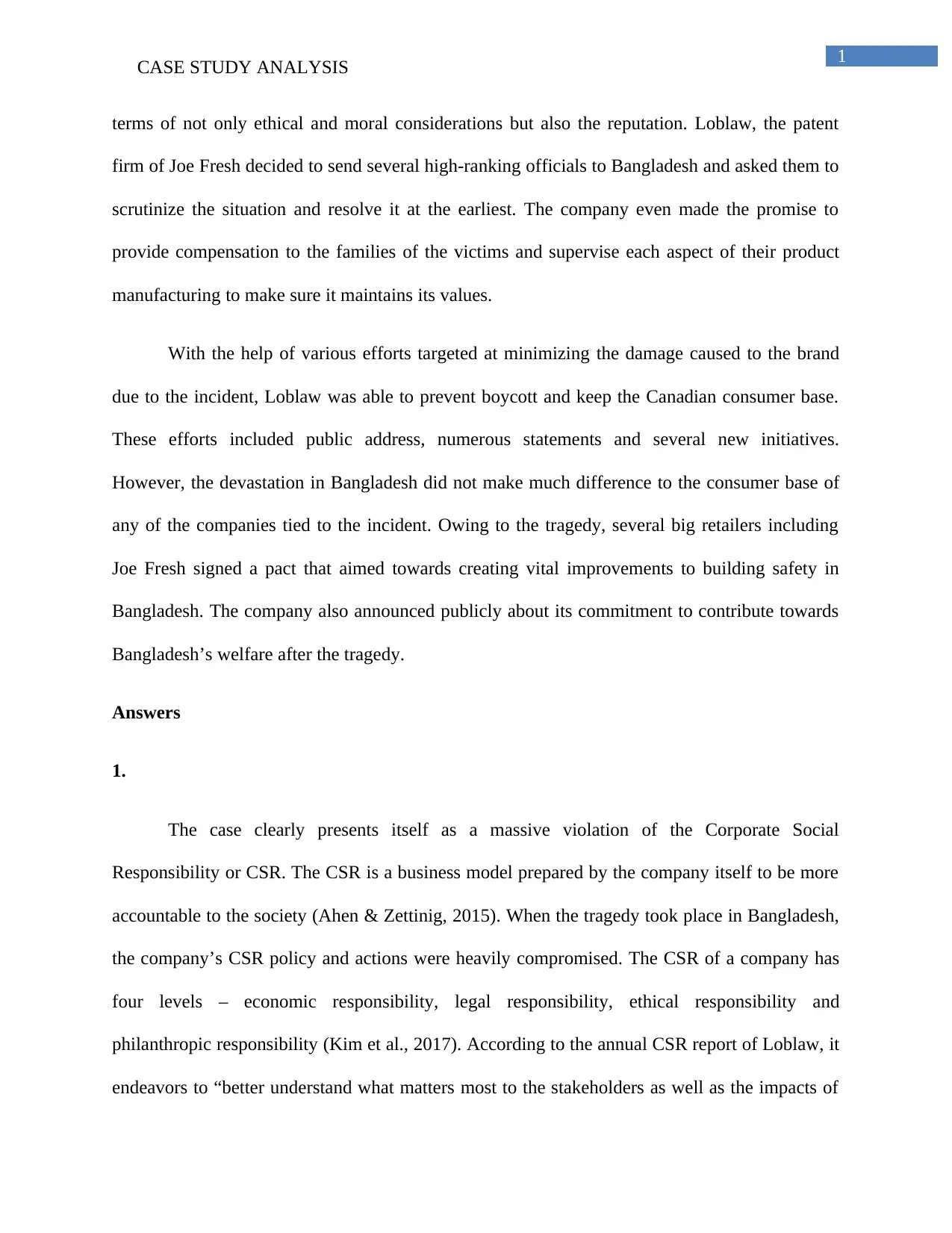
1
CASE STUDY ANALYSIS
terms of not only ethical and moral considerations but also the reputation. Loblaw, the patent
firm of Joe Fresh decided to send several high-ranking officials to Bangladesh and asked them to
scrutinize the situation and resolve it at the earliest. The company even made the promise to
provide compensation to the families of the victims and supervise each aspect of their product
manufacturing to make sure it maintains its values.
With the help of various efforts targeted at minimizing the damage caused to the brand
due to the incident, Loblaw was able to prevent boycott and keep the Canadian consumer base.
These efforts included public address, numerous statements and several new initiatives.
However, the devastation in Bangladesh did not make much difference to the consumer base of
any of the companies tied to the incident. Owing to the tragedy, several big retailers including
Joe Fresh signed a pact that aimed towards creating vital improvements to building safety in
Bangladesh. The company also announced publicly about its commitment to contribute towards
Bangladesh’s welfare after the tragedy.
Answers
1.
The case clearly presents itself as a massive violation of the Corporate Social
Responsibility or CSR. The CSR is a business model prepared by the company itself to be more
accountable to the society (Ahen & Zettinig, 2015). When the tragedy took place in Bangladesh,
the company’s CSR policy and actions were heavily compromised. The CSR of a company has
four levels – economic responsibility, legal responsibility, ethical responsibility and
philanthropic responsibility (Kim et al., 2017). According to the annual CSR report of Loblaw, it
endeavors to “better understand what matters most to the stakeholders as well as the impacts of
CASE STUDY ANALYSIS
terms of not only ethical and moral considerations but also the reputation. Loblaw, the patent
firm of Joe Fresh decided to send several high-ranking officials to Bangladesh and asked them to
scrutinize the situation and resolve it at the earliest. The company even made the promise to
provide compensation to the families of the victims and supervise each aspect of their product
manufacturing to make sure it maintains its values.
With the help of various efforts targeted at minimizing the damage caused to the brand
due to the incident, Loblaw was able to prevent boycott and keep the Canadian consumer base.
These efforts included public address, numerous statements and several new initiatives.
However, the devastation in Bangladesh did not make much difference to the consumer base of
any of the companies tied to the incident. Owing to the tragedy, several big retailers including
Joe Fresh signed a pact that aimed towards creating vital improvements to building safety in
Bangladesh. The company also announced publicly about its commitment to contribute towards
Bangladesh’s welfare after the tragedy.
Answers
1.
The case clearly presents itself as a massive violation of the Corporate Social
Responsibility or CSR. The CSR is a business model prepared by the company itself to be more
accountable to the society (Ahen & Zettinig, 2015). When the tragedy took place in Bangladesh,
the company’s CSR policy and actions were heavily compromised. The CSR of a company has
four levels – economic responsibility, legal responsibility, ethical responsibility and
philanthropic responsibility (Kim et al., 2017). According to the annual CSR report of Loblaw, it
endeavors to “better understand what matters most to the stakeholders as well as the impacts of
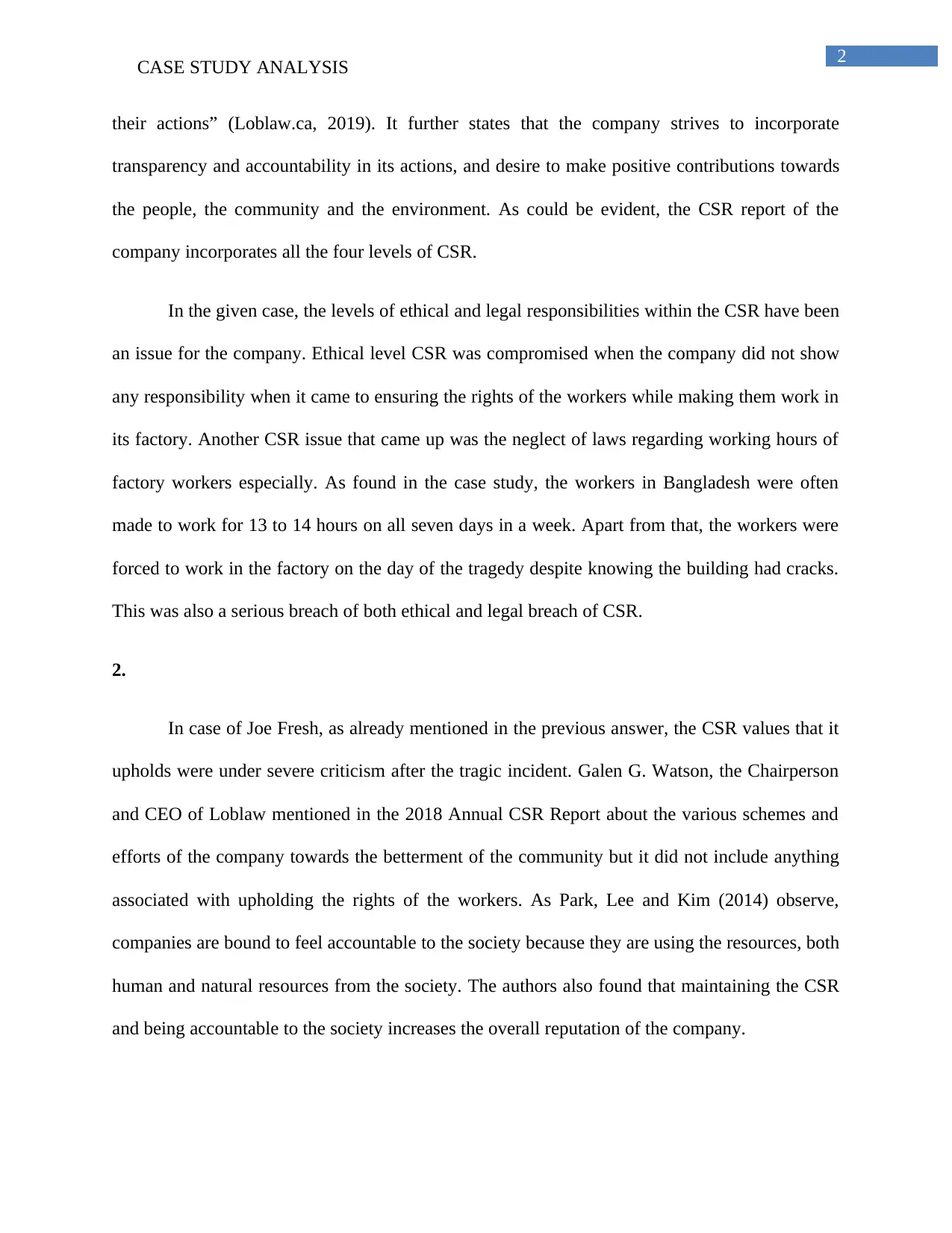
2
CASE STUDY ANALYSIS
their actions” (Loblaw.ca, 2019). It further states that the company strives to incorporate
transparency and accountability in its actions, and desire to make positive contributions towards
the people, the community and the environment. As could be evident, the CSR report of the
company incorporates all the four levels of CSR.
In the given case, the levels of ethical and legal responsibilities within the CSR have been
an issue for the company. Ethical level CSR was compromised when the company did not show
any responsibility when it came to ensuring the rights of the workers while making them work in
its factory. Another CSR issue that came up was the neglect of laws regarding working hours of
factory workers especially. As found in the case study, the workers in Bangladesh were often
made to work for 13 to 14 hours on all seven days in a week. Apart from that, the workers were
forced to work in the factory on the day of the tragedy despite knowing the building had cracks.
This was also a serious breach of both ethical and legal breach of CSR.
2.
In case of Joe Fresh, as already mentioned in the previous answer, the CSR values that it
upholds were under severe criticism after the tragic incident. Galen G. Watson, the Chairperson
and CEO of Loblaw mentioned in the 2018 Annual CSR Report about the various schemes and
efforts of the company towards the betterment of the community but it did not include anything
associated with upholding the rights of the workers. As Park, Lee and Kim (2014) observe,
companies are bound to feel accountable to the society because they are using the resources, both
human and natural resources from the society. The authors also found that maintaining the CSR
and being accountable to the society increases the overall reputation of the company.
CASE STUDY ANALYSIS
their actions” (Loblaw.ca, 2019). It further states that the company strives to incorporate
transparency and accountability in its actions, and desire to make positive contributions towards
the people, the community and the environment. As could be evident, the CSR report of the
company incorporates all the four levels of CSR.
In the given case, the levels of ethical and legal responsibilities within the CSR have been
an issue for the company. Ethical level CSR was compromised when the company did not show
any responsibility when it came to ensuring the rights of the workers while making them work in
its factory. Another CSR issue that came up was the neglect of laws regarding working hours of
factory workers especially. As found in the case study, the workers in Bangladesh were often
made to work for 13 to 14 hours on all seven days in a week. Apart from that, the workers were
forced to work in the factory on the day of the tragedy despite knowing the building had cracks.
This was also a serious breach of both ethical and legal breach of CSR.
2.
In case of Joe Fresh, as already mentioned in the previous answer, the CSR values that it
upholds were under severe criticism after the tragic incident. Galen G. Watson, the Chairperson
and CEO of Loblaw mentioned in the 2018 Annual CSR Report about the various schemes and
efforts of the company towards the betterment of the community but it did not include anything
associated with upholding the rights of the workers. As Park, Lee and Kim (2014) observe,
companies are bound to feel accountable to the society because they are using the resources, both
human and natural resources from the society. The authors also found that maintaining the CSR
and being accountable to the society increases the overall reputation of the company.
⊘ This is a preview!⊘
Do you want full access?
Subscribe today to unlock all pages.

Trusted by 1+ million students worldwide
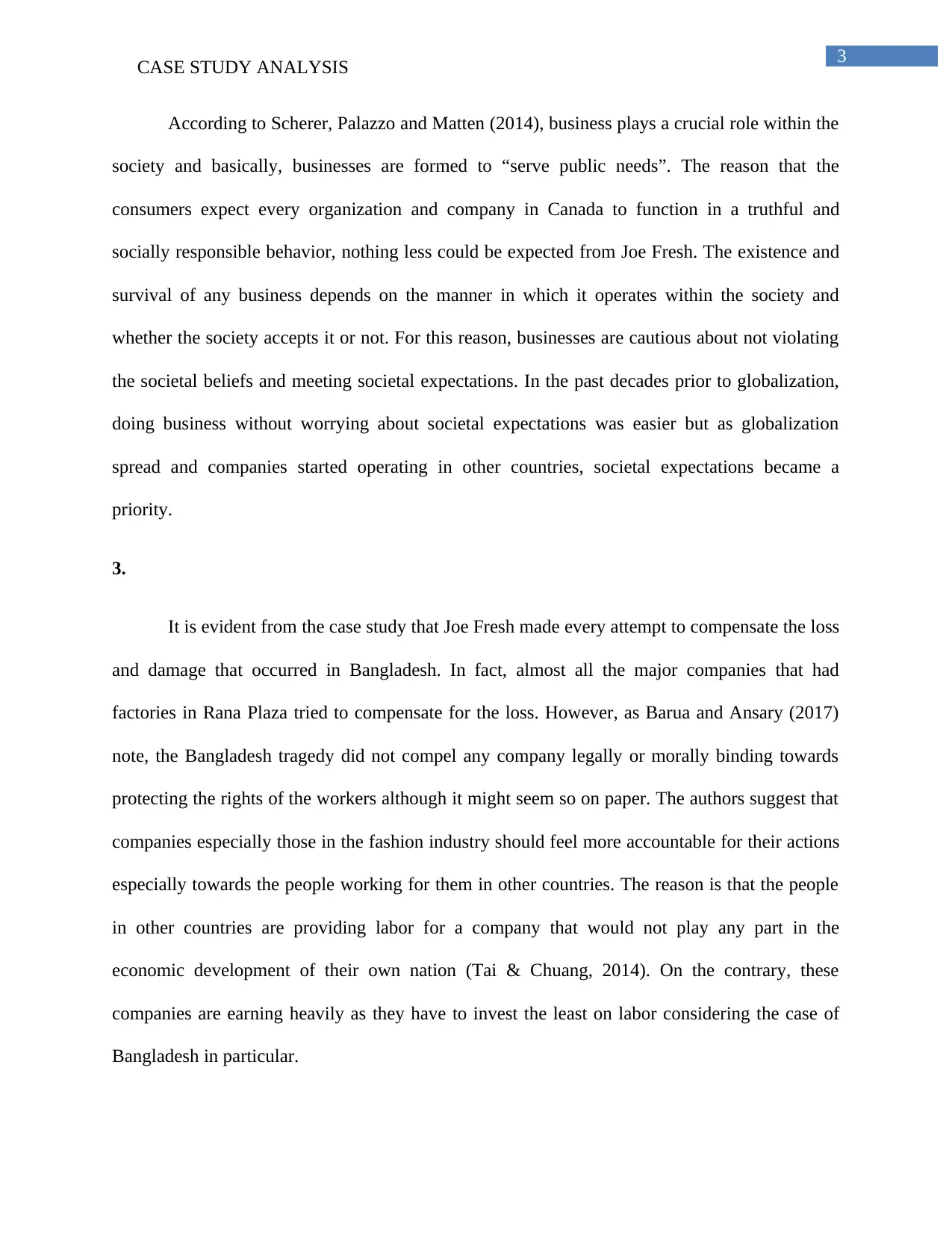
3
CASE STUDY ANALYSIS
According to Scherer, Palazzo and Matten (2014), business plays a crucial role within the
society and basically, businesses are formed to “serve public needs”. The reason that the
consumers expect every organization and company in Canada to function in a truthful and
socially responsible behavior, nothing less could be expected from Joe Fresh. The existence and
survival of any business depends on the manner in which it operates within the society and
whether the society accepts it or not. For this reason, businesses are cautious about not violating
the societal beliefs and meeting societal expectations. In the past decades prior to globalization,
doing business without worrying about societal expectations was easier but as globalization
spread and companies started operating in other countries, societal expectations became a
priority.
3.
It is evident from the case study that Joe Fresh made every attempt to compensate the loss
and damage that occurred in Bangladesh. In fact, almost all the major companies that had
factories in Rana Plaza tried to compensate for the loss. However, as Barua and Ansary (2017)
note, the Bangladesh tragedy did not compel any company legally or morally binding towards
protecting the rights of the workers although it might seem so on paper. The authors suggest that
companies especially those in the fashion industry should feel more accountable for their actions
especially towards the people working for them in other countries. The reason is that the people
in other countries are providing labor for a company that would not play any part in the
economic development of their own nation (Tai & Chuang, 2014). On the contrary, these
companies are earning heavily as they have to invest the least on labor considering the case of
Bangladesh in particular.
CASE STUDY ANALYSIS
According to Scherer, Palazzo and Matten (2014), business plays a crucial role within the
society and basically, businesses are formed to “serve public needs”. The reason that the
consumers expect every organization and company in Canada to function in a truthful and
socially responsible behavior, nothing less could be expected from Joe Fresh. The existence and
survival of any business depends on the manner in which it operates within the society and
whether the society accepts it or not. For this reason, businesses are cautious about not violating
the societal beliefs and meeting societal expectations. In the past decades prior to globalization,
doing business without worrying about societal expectations was easier but as globalization
spread and companies started operating in other countries, societal expectations became a
priority.
3.
It is evident from the case study that Joe Fresh made every attempt to compensate the loss
and damage that occurred in Bangladesh. In fact, almost all the major companies that had
factories in Rana Plaza tried to compensate for the loss. However, as Barua and Ansary (2017)
note, the Bangladesh tragedy did not compel any company legally or morally binding towards
protecting the rights of the workers although it might seem so on paper. The authors suggest that
companies especially those in the fashion industry should feel more accountable for their actions
especially towards the people working for them in other countries. The reason is that the people
in other countries are providing labor for a company that would not play any part in the
economic development of their own nation (Tai & Chuang, 2014). On the contrary, these
companies are earning heavily as they have to invest the least on labor considering the case of
Bangladesh in particular.
Paraphrase This Document
Need a fresh take? Get an instant paraphrase of this document with our AI Paraphraser
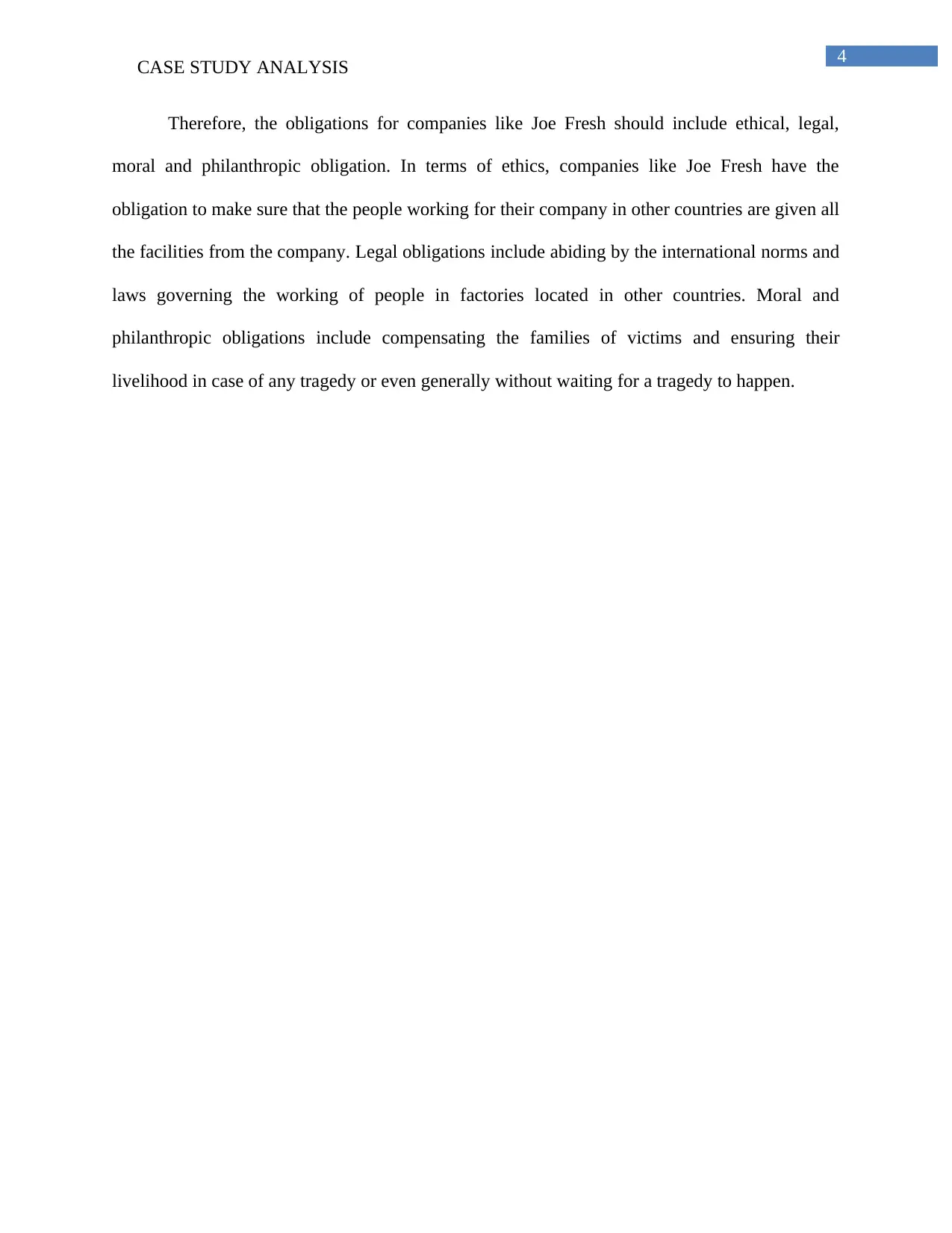
4
CASE STUDY ANALYSIS
Therefore, the obligations for companies like Joe Fresh should include ethical, legal,
moral and philanthropic obligation. In terms of ethics, companies like Joe Fresh have the
obligation to make sure that the people working for their company in other countries are given all
the facilities from the company. Legal obligations include abiding by the international norms and
laws governing the working of people in factories located in other countries. Moral and
philanthropic obligations include compensating the families of victims and ensuring their
livelihood in case of any tragedy or even generally without waiting for a tragedy to happen.
CASE STUDY ANALYSIS
Therefore, the obligations for companies like Joe Fresh should include ethical, legal,
moral and philanthropic obligation. In terms of ethics, companies like Joe Fresh have the
obligation to make sure that the people working for their company in other countries are given all
the facilities from the company. Legal obligations include abiding by the international norms and
laws governing the working of people in factories located in other countries. Moral and
philanthropic obligations include compensating the families of victims and ensuring their
livelihood in case of any tragedy or even generally without waiting for a tragedy to happen.
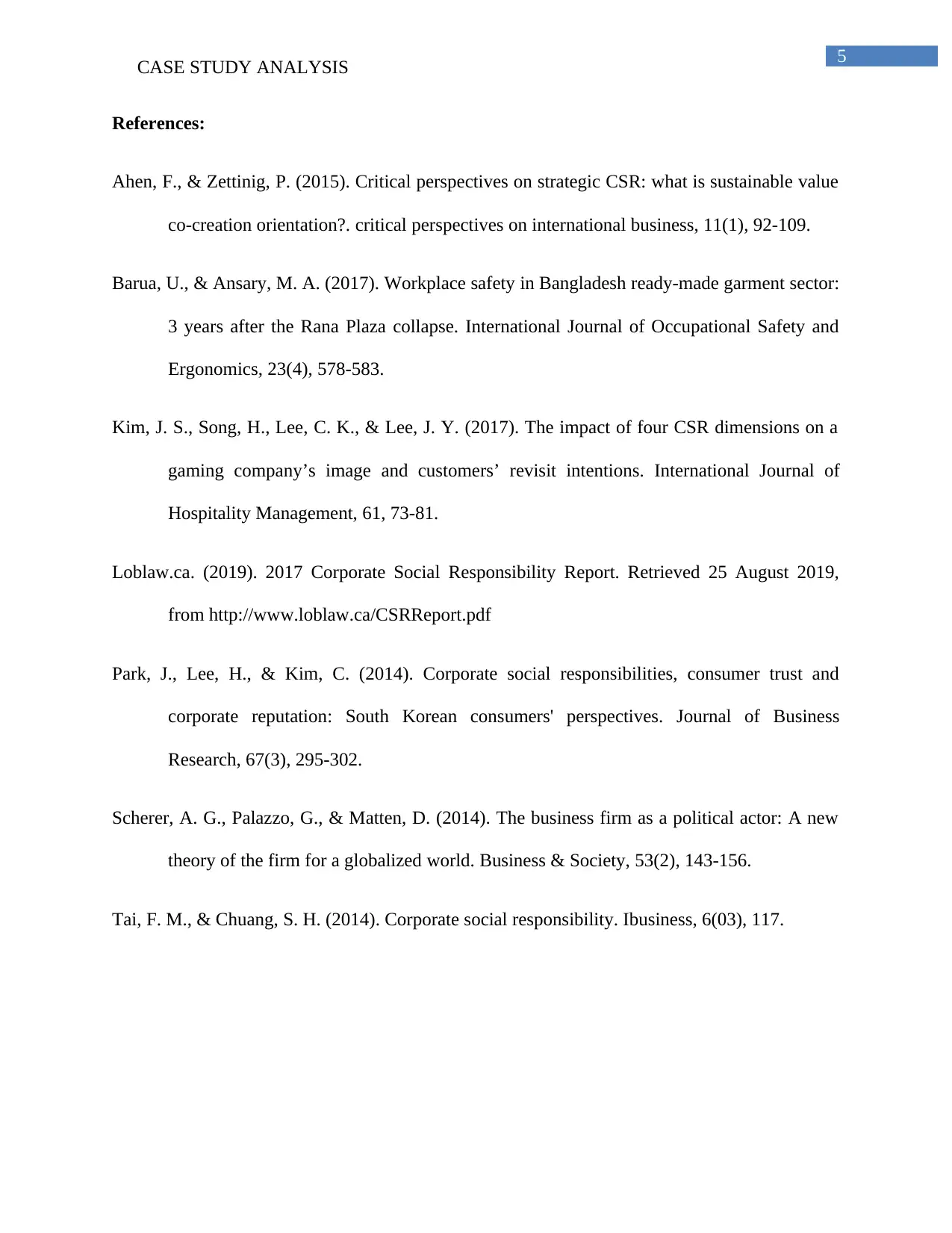
5
CASE STUDY ANALYSIS
References:
Ahen, F., & Zettinig, P. (2015). Critical perspectives on strategic CSR: what is sustainable value
co-creation orientation?. critical perspectives on international business, 11(1), 92-109.
Barua, U., & Ansary, M. A. (2017). Workplace safety in Bangladesh ready-made garment sector:
3 years after the Rana Plaza collapse. International Journal of Occupational Safety and
Ergonomics, 23(4), 578-583.
Kim, J. S., Song, H., Lee, C. K., & Lee, J. Y. (2017). The impact of four CSR dimensions on a
gaming company’s image and customers’ revisit intentions. International Journal of
Hospitality Management, 61, 73-81.
Loblaw.ca. (2019). 2017 Corporate Social Responsibility Report. Retrieved 25 August 2019,
from http://www.loblaw.ca/CSRReport.pdf
Park, J., Lee, H., & Kim, C. (2014). Corporate social responsibilities, consumer trust and
corporate reputation: South Korean consumers' perspectives. Journal of Business
Research, 67(3), 295-302.
Scherer, A. G., Palazzo, G., & Matten, D. (2014). The business firm as a political actor: A new
theory of the firm for a globalized world. Business & Society, 53(2), 143-156.
Tai, F. M., & Chuang, S. H. (2014). Corporate social responsibility. Ibusiness, 6(03), 117.
CASE STUDY ANALYSIS
References:
Ahen, F., & Zettinig, P. (2015). Critical perspectives on strategic CSR: what is sustainable value
co-creation orientation?. critical perspectives on international business, 11(1), 92-109.
Barua, U., & Ansary, M. A. (2017). Workplace safety in Bangladesh ready-made garment sector:
3 years after the Rana Plaza collapse. International Journal of Occupational Safety and
Ergonomics, 23(4), 578-583.
Kim, J. S., Song, H., Lee, C. K., & Lee, J. Y. (2017). The impact of four CSR dimensions on a
gaming company’s image and customers’ revisit intentions. International Journal of
Hospitality Management, 61, 73-81.
Loblaw.ca. (2019). 2017 Corporate Social Responsibility Report. Retrieved 25 August 2019,
from http://www.loblaw.ca/CSRReport.pdf
Park, J., Lee, H., & Kim, C. (2014). Corporate social responsibilities, consumer trust and
corporate reputation: South Korean consumers' perspectives. Journal of Business
Research, 67(3), 295-302.
Scherer, A. G., Palazzo, G., & Matten, D. (2014). The business firm as a political actor: A new
theory of the firm for a globalized world. Business & Society, 53(2), 143-156.
Tai, F. M., & Chuang, S. H. (2014). Corporate social responsibility. Ibusiness, 6(03), 117.
⊘ This is a preview!⊘
Do you want full access?
Subscribe today to unlock all pages.

Trusted by 1+ million students worldwide
1 out of 6
Your All-in-One AI-Powered Toolkit for Academic Success.
+13062052269
info@desklib.com
Available 24*7 on WhatsApp / Email
![[object Object]](/_next/static/media/star-bottom.7253800d.svg)
Unlock your academic potential
Copyright © 2020–2026 A2Z Services. All Rights Reserved. Developed and managed by ZUCOL.

